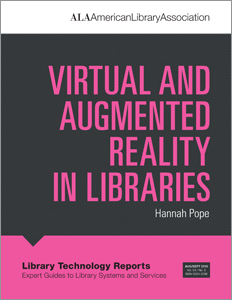The ACRL Technical Interest Group invites you to join us virtually for two
presentations on
Date: Tuesday, June 23rd
Time: 12 PM (CDT)/1 PM (
Place: Zoom
The following will be 20 minute presentations with a 5 minute question
session:
Cataloging Virtual Reality programming: why and how
Joy DuBose, Assistant Professor, Special Collections Cataloger at Mississippi
State University Libraries
When video games really came to the forefront, there were arguments as to
whether these materials should be offered by libraries and whether or not they
should be cataloged. Now with the appearance of virtual reality (VR), which
has games and programming that are mostly in digital format, these arguments
are returning. Many libraries are questioning whether or not to add this
technology, and whether to catalog it.
While VR has taken off in many ways in the public arena, libraries are
somewhat slower to do so. The Mitchell Memorial Library at Mississippi State
University has embraced VR. Through the library students, faculty, and non-
university affiliates can experience VR on several different systems. However,
questions were soon raised on how exactly do we catalog VR programming? This
presentation examines the question of should these materials be cataloged, the
different questions that arose during the process, and the workflow that was
created to catalog these materials.
Register in advance for this webinar:
After registering, you will receive a confirmation email containing
information about joining the webinar.
++++++++++++++++
more on VR in libraries in this IMS blog
https://blog.stcloudstate.edu/ims?s=virtual+reality+libraries
https://www.emeraldinsight.com/eprint/AU2Q4SJGYQG5YTQ5A9RU/full
Hahn, J. (2018). Virtual reality learning environments | Development of multi-user reference support experiences | Information and Learning Science | Ahead of Print.
EmeraldInsight. Retrieved from
https://www.emeraldinsight.com/eprint/AU2Q4SJGYQG5YTQ5A9RU/full
case study: an undergraduate senior projects computer science course collaboration whose aim was to develop textual browsing experiences, among other library reference functionality, within the HTC Vive virtual reality (VR) headset. In this case study, readers are introduced to applied uses of VR in service to library-based learning through the research and development of a VR reading room app with multi-user support. Within the VR reading room prototype, users are able to collaboratively explore the digital collections of HathiTrust, highlight text for further searching and discovery and receive consultative research support from a reference specialist through VR.
Library staff met with the project team weekly over the 16 weeks of both semesters to first scope out the functionality of the system and vet requirements.
The library research team further hypothesized that incorporating reference-like support in the VR environment can support library learning. There is ample evidence in the library literature which underscores the importance of reference interactions as learning and instructional experiences for university students
Educational benefits to immersive worlds include offering a deeper presence in engagement with rare or non-accessible artifacts.
Sequeira and Morgado (2013, p. 2) describe their Virtual Archeology project as using “a blend of techniques and methods employed by historians and archaeologists using computer models for visualizing cultural artefacts and heritage sites”.
The higher-end graphics cards include devices such as the NVIDIA GeForceTM GTX 1060 or AMD RadeonTM RX 480, equivalent or better. The desktop system that was built for this project used the GeForce GTX 1070, which was slightly above the required minimum specifications.
Collaboration: Library as client.
Specific to this course collaboration, computer science students in their final year of study are given the option of several client projects on which to work. The Undergraduate Library has been a collaborator with senior computer science course projects for several years, beginning in 2012-2013 with mobile application design and chat reference software re-engineering (Hahn, 2015). (My note: Mark Gill, this is where and how Mehdi Mekni, you and I can collaborate)
The hurdles the students had the most trouble with was code integration – e.g. combining various individual software parts towards the end of the semester. The students also were challenged by the public HathiTrust APIs, as the system was developed to call the HathiTrust APIs from within the Unity programming environment and developing API calls in C#. This was a novel use of the HathiTrust search APIs for the students and a new area for the research team as well.
There are alternatives to Unity C# programming, notably WebVR, an open source specification for VR programming on the open web.
A-Frame has seen maturation as a platform agnostic and device agnostic software programming environment. The WebVR webpage notes that the specification supports HTC Vive, Oculus Rift, Samsung Gear VR, Google Daydream and Google Cardboard (WebVR Rocks, 2018). Open web platforms are consistent with library values and educational goals of sharing work that can be foundational in implementing VR learning experience both in VR environments and shareable on the web, too.
++++++++++++++
more on VR in libraries in this IMS blog
https://blog.stcloudstate.edu/ims?s=virtual+reality+library

Hannah PopeLibrary Technology Reports
Hannah Pope is the Emerging Technologies Librarian at the Belk Library and Information Commons at Appalachian State University. She has been working with virtual and augmented reality devices for almost two years. She continues to grow the program at her library and frequently works with faculty members to incorporate virtual and augmented reality into their curriculum by providing avenues for students to experience curated applications. Pope has an MS library science degree from the University of North Carolina at Chapel Hill.
+++++++++
more on VR in libraries in this IMS blog
https://blog.stcloudstate.edu/ims?s=virtual+reality+library
